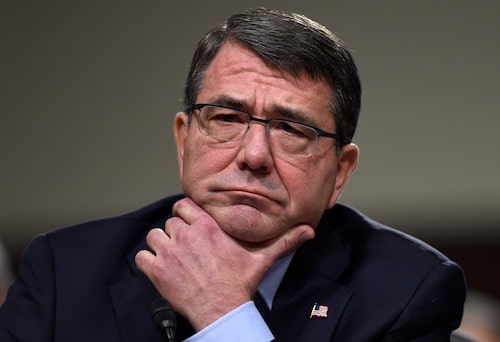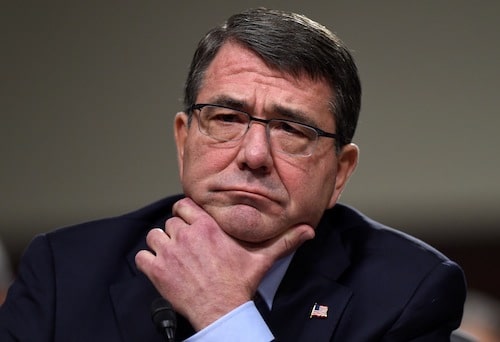What a difference a day makes. Just 24 hours ago US Defense Secretary Ashton Carter was telling the Senate Armed Services Committee all about the Obama Administration’s new military strategy for the Middle East. The headline grabber from his testimony was the revelation that the US military would begin “direct action on the ground” in Iraq and Syria.
“We won’t hold back from supporting capable partners in opportunistic attacks against ISIL (ISIS),” he told the Committee. The new strategy would consist of “three R’s,” he said: more US action, including on the ground, with Syrian opposition partners to take the ISIS stronghold in Raqqa, Syria; more intense cooperation with the Iraqi army including with US-embedded soldiers to retake Ramadi from ISIS in Iraq; and the beginning of US military raids, “whether by strikes from the air or direct action on the ground.”
That was news to the Iraqis, it turns out. And it wasn’t very good news at that. Today Sa’ad al-Hadithi, spokesman for Iraqi Prime Minister Haider al-Abadi, said “thanks but no thanks” to a third US invasion of his country. “We have enough soldiers on the ground,” he said.
This raises the question of whether the US administration intends to insert US soldiers into Iraq against the wishes of its elected government, as it has done and promises to continue to do in Syria. In that case, the US would be shooting at ISIS and the Iraqi government, as well as the Iran-backed Shi’ite militias who are coming to increasingly control large parts of the Iraqi military. Presumably all these forces would be shooting back at US troops on the ground as well. The US would likely be partnering in this task with the anti-ISIS Sunni fighters highlighted in Defense Secretary Carter’s testimony yesterday. In other words, the US would be backing forces closer to those of Saddam Hussein, who they overthrew twelve years ago.
The Iraqi government had requested Russian assistance against ISIS earlier this month, after Russian strikes in Syria appear to have made a significant impact on the battlefield. But Chairman of the US Joint Chiefs of Staff Marine Gen. Joseph Dunford told the Iraqis if they accept Russian assistance they can forget about any more US aid.
It appears the US threat was not enough to put the Iraqis off asking for Russian help, as earlier this week the Iraqi parliament approved Russian airstrikes against ISIS in Iraq.
So the big roll-out of the new US Middle East military strategy seems to have fizzled, as none of the intended beneficiaries of US assistance seem all that enthused about the partnership. For the moment, the US finds itself backing Iranian militias in Iraq while fighting them next door in Syria, while planning to place US troops in with “moderate” anti-Assad rebels in the path of falling Russian bombs. All the while, of course, the US is aiding the Kurds in Syria and Iraq which are currently being bombed by NATO ally Turkey.
What else could possibly go wrong?



